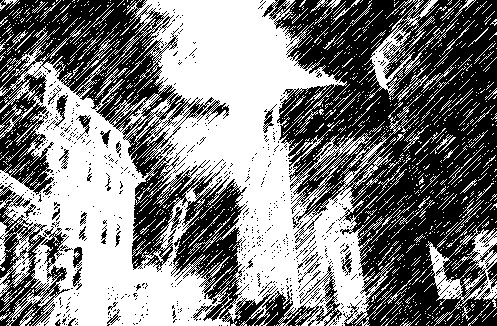Burning Desires
- by Bruce E. McKinney

The Amalia Library fire should ignite discussion of the library's primary role.
It's not supposed to be this way. A library accumulates a million old, and in many cases, rare books. The collection represents years and years of accumulation, care and veneration and then a fire destroys tens of thousands of books. This isn't simply a nightmarish fantasy. It happened this past September at the Anna Amalia Library in Weimar, Germany, and it happens with brain-deadening frequency elsewhere. Books perish. They were not made to survive centuries.
At the Amalia Library it is thought that about 100,000 volumes were seriously damaged or destroyed. Old and rare books are damaged every day. At some auction previews, the extent of casual damage that occurs during personal inspection can be astounding. Try to open a folded map without encouraging tears. Books are fragile, particularly when old and in original condition.
More than ten years ago I bought a first edition of William Bartrams's 1791 classic "Travels through North and South Carolina, East and West Florida, the Cherokee Country, the Extensive Territories of the Muscogulges, or Creek Confederacy; and the Country of the Choctaws." I was told by the seller that it was tender and I didn't fully appreciate what that meant. It was a condition rarity, an important book in very original condition. The front cover gave way after I admired it once too often. It has since been skillfully repaired but a portion of its value lost all the same. Wonderful copies are exceptional artifacts but their exceptional condition becomes a barrier to their use.
A question emerges. Which is paramount: possession or availability? For the collector it is primarily possession. In fact many collectors never connect the dots of their own collections. They tend to accumulate rather than to analyze. And this of course leaves them vulnerable both when buying and selling. They know their material only superficially.
With the internet we're starting to have both possession and availability. I personally favor books with important content. This doesn't mean that the book has to be well written. In fact, in the Americana field, the well written book is the exception. For the collector an understandable way to look at material is to consider the advance of information or successive development. This can be the printing history of a place, the development of an institution from the first pamphlets that promote it, or the pursuit of a category of material such as printings in Indian languages. In the Americana field there are thousands of roads that lead to personal Meccas. In the sciences there is development, categories, periods and types. Science, the timber frame of clear thought, is perhaps the easiest, though not the cheapest, collecting category to understand. Those who collect fiction can collect by type and/or period, by author or school and even by plot type. And there is of course nothing that limits book collecting to books alone. Every author has correspondence and ephemera. Book collecting can be a head-long commitment to acquire one of every printed and written document associated with an author. Collecting is what you make it but it has rarely been more than accumulation. Intellectual insight has tended to come from historians and other writers. Collectors acquire. Intellectuals evaluate. Libraries distribute.